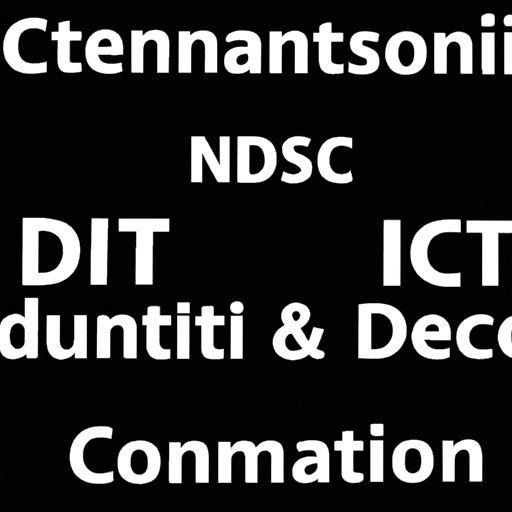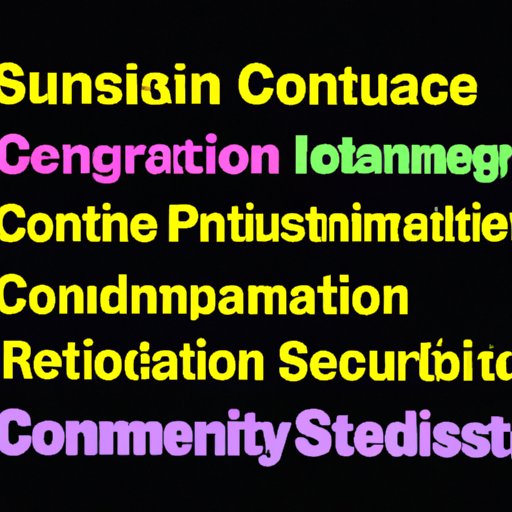Introduction
As the digital revolution continues to expand, the need for professionals with expertise in computer science and information technology (IT) has grown exponentially. For those considering a degree in either field, it can be difficult to decide which degree is better suited to their needs and future goals. This article will explore the differences between a computer science and an IT degree, comparing job prospects, curriculum, cost, career opportunities, skillsets, and demand in order to determine which degree offers more advantages.

Comparing the Job Prospects of Computer Science vs. Information Technology
The job prospects for graduates of both computer science and IT degrees are generally positive. According to the U.S. Bureau of Labor Statistics, the median salary for computer and information technology occupations was $86,320 in May 2019, and employment of these occupations is projected to grow 11% from 2018 to 2028, faster than the average for all occupations. However, the job outlook for each degree varies slightly.
Overview of Job Prospects in Computer Science
Computer science graduates typically find work as software developers, computer systems analysts, or web developers, among other positions. Software developers design, test, and develop software applications, while computer systems analysts evaluate an organization’s computer systems and recommend changes to improve efficiency. Web developers create websites and associated applications.
Overview of Job Prospects in Information Technology
Information technology graduates often find work as network administrators, computer support specialists, or computer programmers. Network administrators install and maintain computer networks, while computer support specialists provide technical assistance to computer users. Computer programmers write code to create software applications.
Comparison of Job Prospects
Overall, computer science graduates have more opportunities than IT graduates due to the broader range of positions available. Software development and web development are two of the most in-demand jobs in the tech industry, and computer science graduates are more likely to qualify for these roles than IT graduates. That said, IT graduates may find more success in roles that require more specialized knowledge, such as network administration and computer programming.

An Overview of the Curriculum for Computer Science and Information Technology
The courses required for each degree vary depending on the institution, but there are some commonalities. In general, a computer science degree focuses more heavily on programming, algorithms, and mathematics, while an IT degree emphasizes networking, system administration, and database management.
Overview of Computer Science Courses
Computer science degrees typically include courses in programming languages, data structures, operating systems, software engineering, artificial intelligence, and computer architecture. Electives may include topics such as game development, mobile app development, and computer graphics.
Overview of Information Technology Courses
Information technology degrees usually include courses in network security, system administration, database management, web development, and computer forensics. Electives may include topics such as mobile device management, cloud computing, and virtualization.
Comparison of Core Courses and Electives
Computer science degrees offer more courses related to programming and algorithms, while IT degrees provide more courses related to networking and system administration. Both degrees offer electives on topics such as mobile app development, cloud computing, and game development, but computer science degrees tend to offer more specialized electives.
Exploring the Cost of a Computer Science or Information Technology Degree
The cost of a computer science or IT degree depends largely on the institution and whether the student is enrolled in an online or on-campus program. Tuition costs can also vary depending on whether the program is offered as a certificate, associate’s degree, or bachelor’s degree.
Tuition Costs for Computer Science Degrees
The average tuition cost for a certificate in computer science ranges from $3,000 to $7,000, while the cost for an associate’s degree ranges from $6,000 to $20,000. The cost for a bachelor’s degree in computer science ranges from $9,000 to $40,000.
Tuition Costs for Information Technology Degrees
The cost of a certificate in information technology ranges from $2,000 to $6,000, while the cost for an associate’s degree ranges from $4,000 to $18,000. The cost for a bachelor’s degree in information technology ranges from $8,000 to $36,000.
Additional Expenses for Both Degrees
In addition to tuition, students should consider additional expenses such as books, supplies, and living expenses. Online programs may also require students to purchase hardware and software. Additionally, students should factor in the cost of any certification exams they may need to take in order to become certified in their chosen field.
Examining Career Opportunities in Computer Science and Information Technology
Computer science and IT degrees open up a wide range of career opportunities. While the job outlook is generally positive for both degrees, computer science graduates tend to have more opportunities due to the breadth of their skillset.
Overview of Career Opportunities in Computer Science
Computer science graduates can pursue a variety of careers, including software developer, computer systems analyst, web developer, database administrator, and computer programmer. They may also find work in fields such as game development, mobile app development, and computer graphics.
Overview of Career Opportunities in Information Technology
Information technology graduates can pursue careers as network administrators, computer support specialists, computer programmers, or database administrators. They may also find work in fields such as mobile device management, cloud computing, and virtualization.
Comparison of Entry Level Salaries
According to PayScale, the median salary for entry level computer science jobs is $67,857, while the median salary for entry level IT jobs is $51,842. As such, computer science graduates tend to have higher starting salaries than those with IT degrees.
Analyzing the Skillsets Needed for Computer Science and Information Technology
The skillsets required for each degree vary depending on the position, but there are some commonalities. In general, computer science majors need to have a strong understanding of programming languages, algorithms, and mathematics, while IT majors must have a thorough knowledge of networking, system administration, and database management.
Overview of Required Skills for Computer Science
Computer science majors must have a strong understanding of programming languages such as Java, C++, and Python, as well as algorithms, data structures, and operating systems. They must also have a good grasp of mathematics, especially calculus and discrete mathematics.
Overview of Required Skills for Information Technology
IT majors must have a thorough understanding of networking, system administration, and database management. They should also have a strong knowledge of web development, computer forensics, and mobile device management. Additionally, they should be familiar with virtualization and cloud computing.
Comparison of Skillsets
Computer science majors have a broader range of skills than IT majors due to the focus on programming and mathematics. However, IT majors have a more specialized set of skills that can be beneficial in certain roles, such as network administration and computer programming.

Assessing the Level of Demand for Computer Science and Information Technology Professionals
The demand for computer science and IT professionals is high, and is expected to remain so for the foreseeable future. According to the U.S. Bureau of Labor Statistics, the demand for computer and information technology occupations is projected to grow 11% from 2018 to 2028, faster than the average for all occupations.
Overview of Demand for Computer Science Professionals
Software development, web development, and computer systems analysis are three of the most in-demand jobs in the tech industry, and computer science graduates are best suited for these roles. Additionally, computer science majors are increasingly sought after for roles in game development, mobile app development, and computer graphics.
Overview of Demand for Information Technology Professionals
Network administration, computer support, and computer programming are three of the most in-demand jobs in the IT industry, and IT graduates are best suited for these roles. Additionally, IT majors are increasingly sought after for roles in mobile device management, cloud computing, and virtualization.
Comparison of Demand for Each Profession
Overall, the demand for computer science graduates is higher due to the broader range of positions available. However, IT graduates may find more success in roles that require more specialized knowledge, such as network administration and computer programming.
Conclusion
Both computer science and information technology degrees offer excellent job prospects and career opportunities. Computer science majors have a broader range of skills, which makes them more attractive to employers, and they tend to have higher starting salaries. However, IT majors have a more specialized set of skills that can be beneficial in certain roles, such as network administration and computer programming. Ultimately, the decision of which degree is better comes down to the individual’s interests, skills, and future goals.
(Note: Is this article not meeting your expectations? Do you have knowledge or insights to share? Unlock new opportunities and expand your reach by joining our authors team. Click Registration to join us and share your expertise with our readers.)

Hi, are you keen to contribute a guest post to our blog or even write paid articles in the long-term? Hit me up at stephen.yeo[at]airdroid[dot]com and we can discuss further. Have a great day!
Dear Yeo, I would like to extend an invitation for you to write some articles for us. Your expertise would provide accurate and professional content for our audience, and also potentially bring new audience to you.